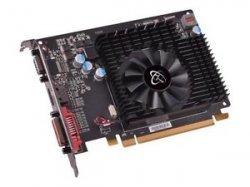AMD Radeon HD 6670 Bitcoin mining
Earlier today one of our news editors, Andrew Cunningham, came to me with an interesting problem. HP was launching their gaming-oriented Phoenix desktop, and the spec sheet listed a video card he had never seen before: the Radeon HD 7670. Initially thinking it was a typo on HP’s part we did some digging, and after finding a well-hidden product page we had our answer. It’s Turks.
| AMD Radeon HD 7670 | AMD Radeon HD 6670 | |
| Stream Processors | 480 | |
| Texture Units | 24 | |
| ROPs | 8 | |
| Core Clock | 800MHz | |
| Memory Clock | 1GHz (4GHz data rate) GDDR5 | |
| Memory Bus Width | 128-bit | |
| VRAM | 512MB/1GB | 1GB |
| FP64 | N/A | |
| Transistor Count | 716M | |
| TDP | 66W | |
| Architecture | VLIW5 | |
| Manufacturing Process | TSMC 40nm |
There are days I’d like to think that it’s the OEM market that’s the oddball, but the truth of the matter is that it’s the retail discrete market that’s the oddball. The OEM market – mobile and discrete – is in fact the norm, as OEM video card sales absolutely dwarf retail discrete video card sales. So much of what we take for granted with retail cards – well defined specifications and formal product announcements through press releases – simply don’t happen in the OEM market. Instead the OEM market is ambiguous on its best days and secretive at its worst, and as a result OEM-only products rarely get a formal announcement, and you would never know about some products if not for the fact that OEMs list them in their system specifications like HP did in this case. Ultimately because of the ambiguity in the OEM market and the need to push specifications, some of the most ridiculous video cards are launched here.







